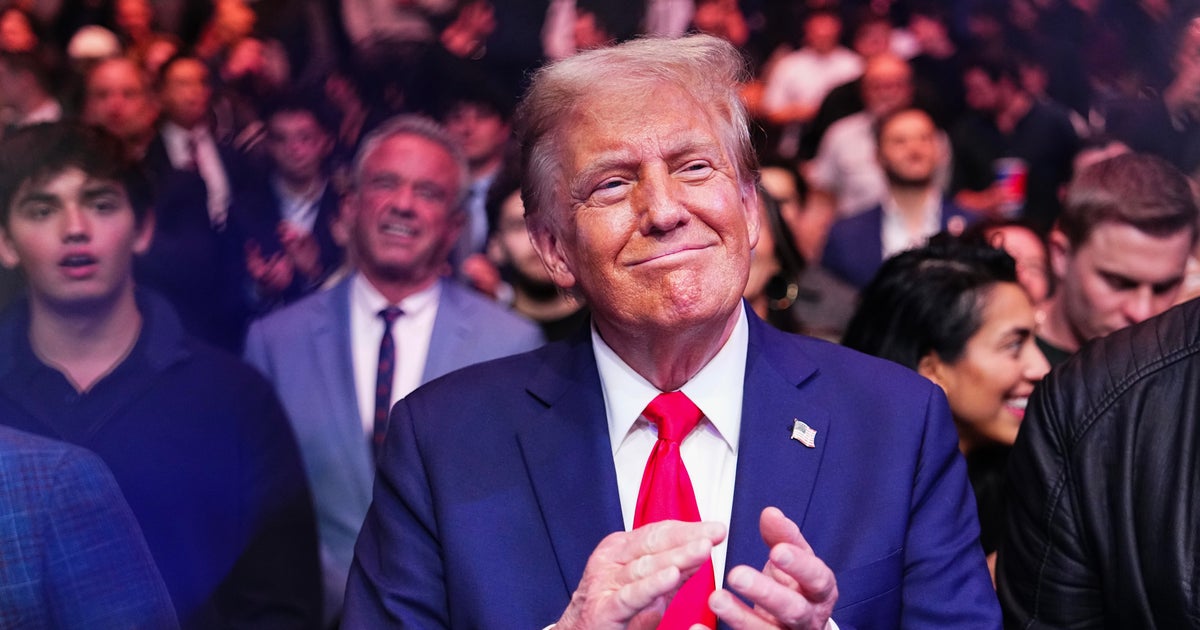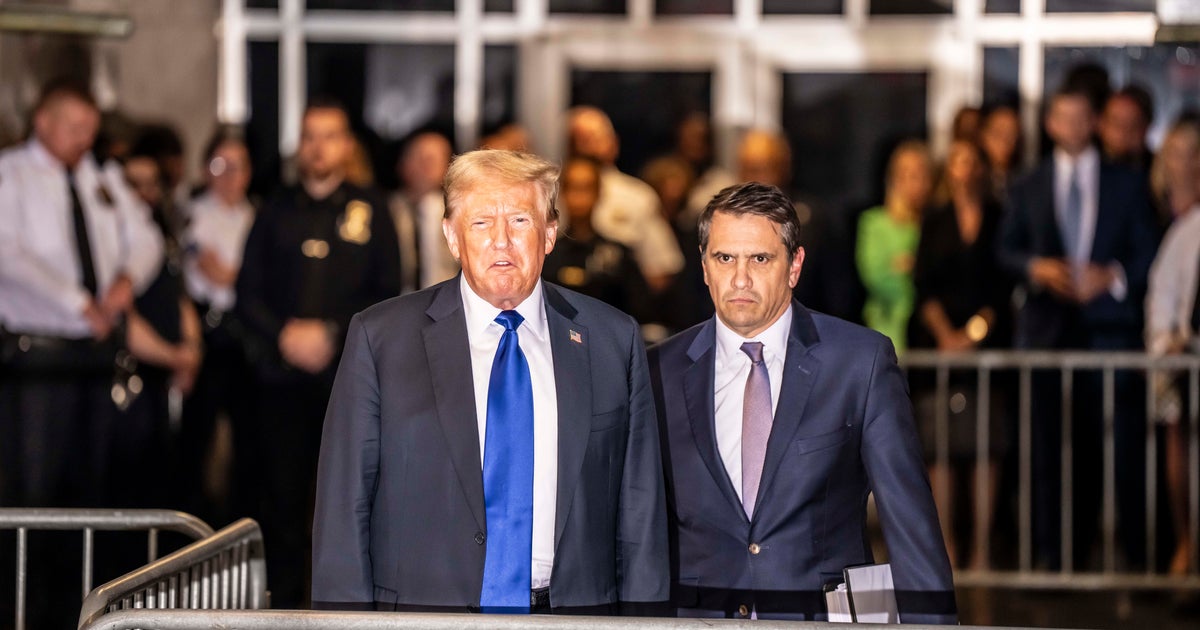Volker raised concerns about Giuliani with "a number of people" for months
Washington — The House committees leading the impeachment inquiry released the transcript of an interview with Kurt Volker, the former special envoy to Ukraine who was a central figure in efforts to pressure the Ukrainian government to open investigations into President Trump's political rivals.
In his opening statement during closed-door testimony on October 3, Volker told lawmakers he was "never asked to do anything" he thought was wrong, "including by the president," but expressed concerns that the U.S. relationship with Ukraine was "getting sucked into a domestic political debate."
Volker said he raised concerns with "a number of people" from May to August 2019 about the role played in U.S.-Ukraine relations by Rudy Giuliani, the president's personal lawyer, and that he had never seen someone in a position like Giuliani's play a similar part in U.S. foreign relations.
Rudy Giuliani's role
When Volker tried to inform Mr. Trump about Ukraine's new president, whom he believed was different from his predecessor and worthy of U.S. support, Volker said that Mr. Trump replied that it wasn't what he had heard from Giuliani.
"He gave the example of hearing from Rudy Giuliani that they're all corrupt, they're all terrible people" and that "they tried to take [Mr. Trump] down" in the 2016 election.
In Volker's telling, he and other officials, including U.S. Ambassador to the European Union Gordon Sondland, urged the president to engage with Ukraine's newly elected president because "going after oligarchs and corruption in Ukraine is not going to be easy, and he's going to need support."
But according to Volker, Giuliani stood in the way. He said that "a negative narrative" from others, including Giuliani, was "impeding our ability to support the new Ukrainian government."
At one point, Volker said the Ukrainians asked to speak to Giuliani so that they could "convey that they really are different."
It was Giuliani, Volker said, who insisted that the Ukrainians had to publicly commit to investigating Burisma and interference in the 2016 presidential election in order to secure a White House meeting. Volker said to lawmakers that a White House meeting would have been an important show of support for Ukrainian President Volodymyr Zelensky .
The U.S. insisted on vetting the statement that Ukraine would make -- one iteration wasn't received well by Giuliani.
"'Well, if it doesn't say Burisma and if it doesn't say 2016, what does it mean? You know, it's not credible,'" Giuliani said, according to Volker's recollection.
Trump and Zelensky
Volker said he didn't recall Mr. Trump asking Zelensky to investigate 2016 election interference, but he "did hear that separately from Mr. Giuliani."
"I became aware of the President being interested in investigations concerning Vice President Biden and his son on September 25th when the transcript of the phone call came out," Volker said.
When asked whether the president had withheld or delayed a meeting with Zelensky until he committed to investigating the 2016 election, Volker said, "We did have difficulty scheduling a meeting, but there was no linkage like that."
During his July 25 call with Zelensky, Mr. Trump said, "There's a lot of talk about Biden's son, that Biden stopped the prosecution, and a lot of people want to find out about that, so whatever you can do with the acting with the Attorney General would be great."
And while Mr. Trump didn't specifically use the word "investigate" with Zelensky in reference to Biden, Volker said, "I don't think you can make any other assumption than that [he] meant investigate … in an official, legal channel."
Volker, however, claimed that in his conversations with Ukrainian officials, they "never communicated a belief that there was a quid pro quo." And he said that he had never had any conversations about a quid pro quo of any kind.
U.S. military aid for Ukraine
Volker said that the suspension of military aid came to his attention on July 18, a week before the president's call with Zelensky. He told the committees that he had tried to find out the reason for the suspension, but "nobody ever gave a reason why."
He said withholding the aid struck him as "problematic," and he "acted immediately to argue this has to be reversed."
However, Volker also refuted the idea that military aid was used as a bargaining chip for a White House meeting. He told the committee that he didn't believe the Ukrainians were even immediately aware that the assistance had been suspended. "I don't believe -- they were aware at the time, so there was no leverage implied."
He recalled that he had spoken with top Zelensky adviser Andriy Yermak about whether Ukraine would produce a statement about fighting corruption, and that "was in the middle of August." But the news of the aid hold did not reach Ukrainian officials "until the end of August," Volker said. By then, Volker said, "[W]e had dropped the idea of even looking at a statement."
In fact, Volker said, by August 29, national security adviser John Bolton had visited Ukraine and was working on scheduling a Zelensky visit to Washington, in addition to a meeting in Warsaw. Without having made the anti-corruption statement, Ukraine was already "ramping up" in its engagement with the U.S. "So I think they were actually feeling pretty good by then," Volker said.
But Volker's text messages from that timeframe seemed to tell a different story. A committee staffer pointed out that in text messages from September 1 — just two days later — Ukraine Chargé d'Affaires Bill Taylor, upon finding out about the suspension of military aid, had texted Volker and Sondland to ask, "Are we now saying that security assistance and White House meeting are conditioned on investigations?"
Giuliani and the Bidens
Giuliani talked about the Bidens at a breakfast in May with Volker, who said that Giuliani had been "repeating a lot of things that were in the media," including Biden's role in the firing of former Ukrainian Prosecutor General Viktor Shokin and the fact that Biden's son worked for a Ukrainian energy company. Volker testified that this was what he told Giuliani about Biden:
"I said to Rudy in that breakfast the first time we sat down to talk that it is simply not credible to me that Joe Biden would be influenced in his duties as Vice President by money or things for his son or anything like that. I've known him a long time, he's a person of integrity, and that's not credible."
He later reiterated, "I pushed back on his discussing the Bidens." He said he told Giuliani, "I don't put any credibility in this at all." Burisma or Ukraine "may have wanted to buy influence in some way," Volker said, but "that's another matter."
Volker told lawmakers that after that conversation, Giuliani "never brought up Biden or Bidens with me again. And so, when we talked or heard Burisma, I literally meant Burisma and that, not the conflation of that with the Bidens."
He also said that he resigned because he "could see this coming," alluding to the impeachment inquiry, and wanted to "provide testimony … with as much candor and integrity as I possibly could."
The committee also released a trove of text messages between Volker, other diplomats and Ukrainian officials.
Text messages
The committees also released all the text messages submitted by Volker, which portray the attempts by Volker and other diplomats to broker a White House meeting between Zelensky and Mr. Trump.
In a text to Volker on July 19, Bill Taylor acknowledged that Ukraine's concern about being used to help Mr. Trump politically. "President Zelensky is sensitive about Ukraine being taken seriously. Not merely as an instrument in Washington domestic reelection politics," he wrote.
Volker on July 25, the day of the call, implied that Zelensky's White House visit was conditioned upon whether he investigated the 2016 election. "Heard from white house – assuming president Z convinces trump he will investigate / "get to the bottom of what happened" in 2016 we will nail down date for visit to Washington," he wrote.
For Taylor, however, reports that the congressionally approved military aid for Ukraine had been suspended raised a new problem, and he texted Sondland to express dismay at the idea that security assistance and a White House meeting could be reliant on a statement about investigations. Sondland replied: "call me."



